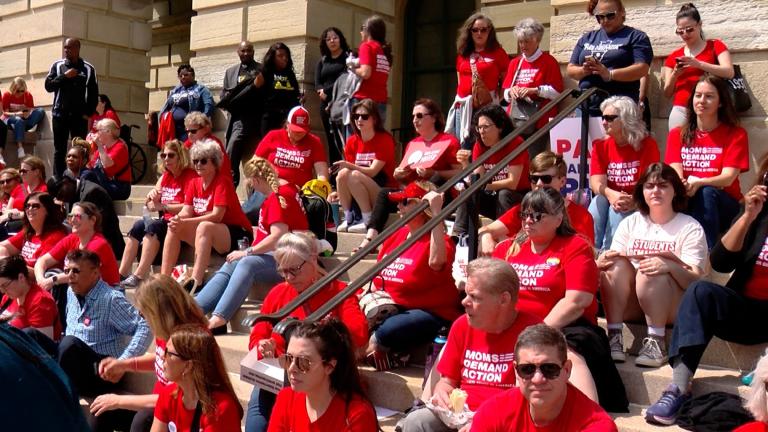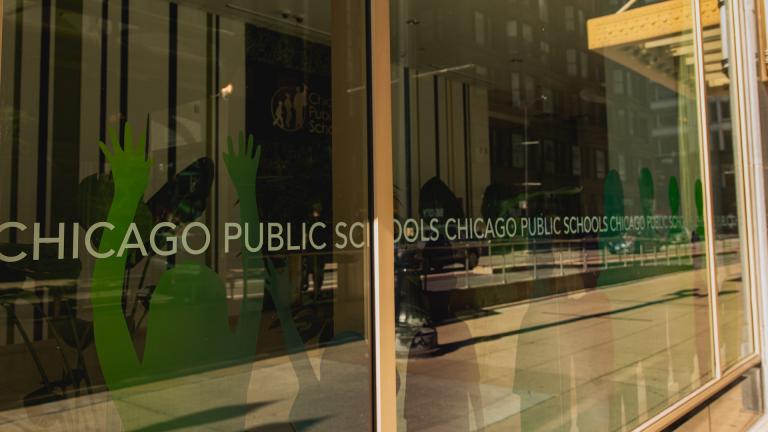Illinois legislators are meeting in Springfield for the final session of 2021. It’s technically the annual fall veto session – the General Assembly’s chance to override bills that members passed then the governor rejected – but there weren’t any vetoes on which to act. Instead, lawmakers are dealing with hot-button issues like abortion, COVID-19 mandates, new congressional boundaries, and other unfinished business.
Here’s a check list of some of the most prominent measures:
Redistricting: Hearings Set for Thursday
Democrats unveiled a new potential map of congressional districts late Wednesday night; legislators and the public will get the first crack at reviewing them during hearings set for Thursday, the same day state lawmakers are expected to give them final approval.
It’s the third version they’ve put forth as possible districts candidates for the U.S. House will run in for the next decade, starting in the 2022 election. Population gains in other states mean Illinois is losing a seat. The latest plan for a 17-member Illinois delegation creates two districts concertedly designed to have sizable Hispanic populations, rather than the single Latino district Illinois has now.
Abortion: Repeal of Parental Notification Act (HB370) Approved by Both Chambers
Illinois law (Public Act 101-0013 / 405 ILCS 5/3-610) has since 2019 recognized access to abortions as a “fundamental right.”
But abortion rights advocates say an older law, the Parental Notification Act of 1995 (Public Act 89-18 / 750 ILCS 70) is a “gaping hole” that infringes on that right. The law requires parents receive at least 48 hours’ notice before their minor child can receive an abortion.
Advocates are capitalizing on frustration with Texas’ new abortion restrictions to repeal Illinois’ parental notice requirement.
“We are seeing it all over the country, anti-abortion politicians all across the country are seeking to curb our access to abortion for anyone and everyone. They literally want to force us all to keep every pregnancy to term regardless of what’s happening, regardless of the risks to our lives,” state Rep. Kelly Cassidy, D-Chicago, said. “Illinois is different and it’s going to stay different, and we’re going to finish the work today by closing the loophole in our firewall.”
Cassidy said the notification requirement treats minors differently if they want an abortion rather than other forms of health and reproductive care.
“You can get pregnant. You can stay pregnant. You can give birth, you can have a C-section, you can give a child up for adoption, all without ever having anybody call your parent. To say that this is not about abortion, that this is about some high-minded protection for you all is a flat out lie,” Cassidy said.
The Illinois Senate approved the measure (House Bill 370) on Tuesday.
The House, on a 62 –51 vote, approved the proposal just before midnight Wednesday.
“The reason for repeal is many,” Anna Moeller, D-Elgin said. “The minority of young people who are not able to talk to their parents have serious reasons for not doing so, such as fear of physical or emotional abuse, loss of financial support or homelessness, fear of being forced to give birth against their will, or serious family problems such as a parent who is sick or in prison.”
The measure received no Republican support.
“It’s about parents having the basic right to know what is going on in their minor child’s life. It’s so common sense,” Rep. Avery Bourne, R-Morrisonville, said in an emotional speech pleading with legislators to vote against the rollback. “That’s what this bill requires. That parents have the opportunity to know what’s going on in their daughter’s life.”
Gov. J.B. Pritzker has indicated he supports repeal of the notification act.
The proposal, which will next go to his desk for action, also creates a working group charged with identifying resources pregnant and parenting youth may need.
Health Care Right of Conscience Act Revision (SB1169): Passes House, Awaits Senate Action
Another law related to abortion that’s been on the books in Illinois since the ‘90s is rearing its head now in an unexpected way.
The Health Care Right of Conscience Act (745 ILCS 70/) was intended to protect doctors from having to perform medical procedures to which they’re morally opposed, namely abortions.
The law states that “it is the public policy of the State of Illinois to respect and protect the right of conscience of all persons who refuse to obtain, receive or accept … health care services and medical care … and to prohibit all forms of discrimination, disqualification, coercion, disability or imposition of liability upon such persons or entities by reason of their refusing to act contrary to their conscience or conscientious convictions in providing, paying for, or refusing to obtain, receive, accept… health care services and medical care.”
Teachers, nurses and other workers are citing the law as a reason to avoid compliance with workplace mandates that they wear masks, get tested for the coronavirus or receive the COVID-19 vaccine.
“The Health Care Right of Conscience Act was never intended to cover a pandemic where we’re trying to keep people alive,” Pritzker said on Wednesday. “An individual just yelling out ‘conscience’ and saying ‘I don’t want to do it’ isn’t good enough. We have to keep people healthy and safe. That’s the whole purpose of the mitigations that we’ve put in place.”
Pritzker and Illinois Attorney General Kwame Raoul say Illinois will be in trouble if legislators leave Springfield without modifying the Health Care Right of Conscience Act (Senate Bill 1169) to say that it’s not a violation for public or private employers to institute requirements “intended to prevent contraction or transmission of COVID-19.”
Despite those warnings, Pritzker and Raoul have struggled to drum up enough support within their Democratic super majorities to win approval of that fix in the House.
More than 50,000 individuals sent slips opposing amending the Right of Conscience Act.
“Government is supposed to persuade, not force,” Rep. Deanne Mazzochi, R-Elmhurst said. “We are citizens, not subjects.”
She said the change is a “backdoor” vaccine mandate “without accountability or escape valve for religious liberty” that takes away the ability of the “little guy” to fight government and corporate overreach.
There’s enough pushback along those lines that instead of amending the law so it takes effect immediately – something which requires support from three-fifths of the legislature – the General Assembly is debating a proposal that would not take effect until June 2022. Passing a bill with a delayed effective date requires support from only a simple majority.
While that’s more than 200 days away, the belief is it could still hold sway over judges presiding over at deluge of court cases brought by individuals suing to avoid losing their jobs over their refusal to employ with workplace COVID-19 requirements.
House Sponsor Robyn Gabel, D-Evanston, said the change is a “clarification of existing law.”
“Anyone who claims otherwise is engaging in the spread of misinformation,” and is intentionally distorting the law to “justify their desire to thumb their noses at mitigation to stop COVID’s spread,” Gabel said.
State Rep. Mark Batinick, R-Plainfield, said the change will cause those who are hesitant or scared about getting vaccinated to dig in their heels.
He said the legislature is to blame because the General Assembly has avoided passing laws to fight COVID-19, relying instead on Pritzker to use his executive authority.
“We haven’t done our job for 20 months debating these nuances,” Batinick said.
As of Wednesday, 25,707 Illinoisans have died from COVID-19, according to the Illinois Department of Public Health
Chicago Elected School Board: Trailer Bill (SB1784):
Come 2026, Chicago Public Schools will no longer qualify as the state’s only district with a school board appointed by the mayor rather than elected by residents.
The legislature earlier this year passed a law (HB2908) that moves CPS to an elected school board, with elections for some seats beginning in 2024.
That’s still the case.
But during the veto session, lawmakers made some tweaks to other provisions of that law:
—Moves up a moratorium on school closures. The ban on CPS closing schools takes effect right away rather than June 2022.
—Requires an independent review of CPS’s finances be completed by October 2022.
—Specifies that elected CPS board member positions are unpaid.
College Sports Betting (HB3136):
Never bet on easy passage of a gambling measure, but it’s possible.
The latest attempt (House Bill 3136) would lift a ban on betting on Illinois college sports.
When Illinois legalized sports betting in 2019, lawmakers prohibited wagers on any match, game or competition with an athlete or team from an Illinois school.
A bipartisan panel on Wednesday gave the nod to allowing bets for tier 1 college competitions.
The temporary program, which would expire in July 2023, would still not allow bets on Illinois college teams to be made online.
And while gamblers can otherwise place wagers on an individual athlete’s performance, that would be not permitted for university level wagers.
The measure would also forbid municipalities from enacting a local “push” tax whenever someone pushes a button on a video game machine.
Under the proposal, veteran’s and fraternal organizations everywhere besides Chicago and Cook County would be able offer video gaming even if there’s a local ban.
Follow Amanda Vinicky on Twitter: @AmandaVinicky








